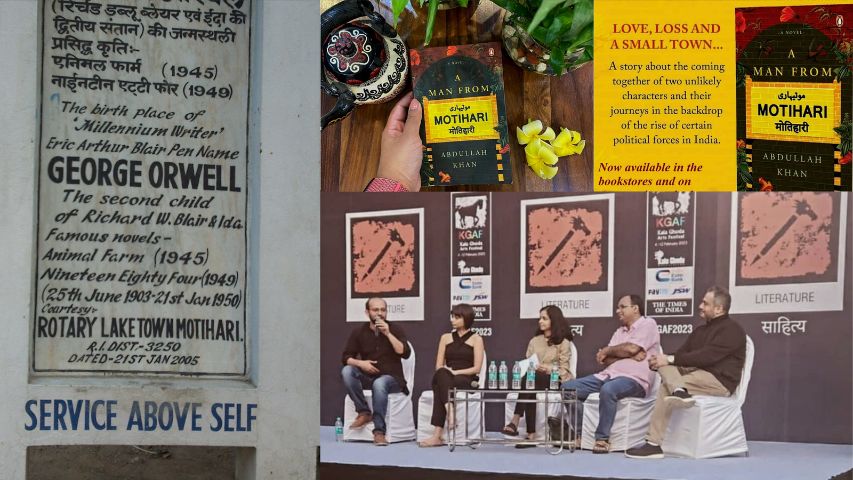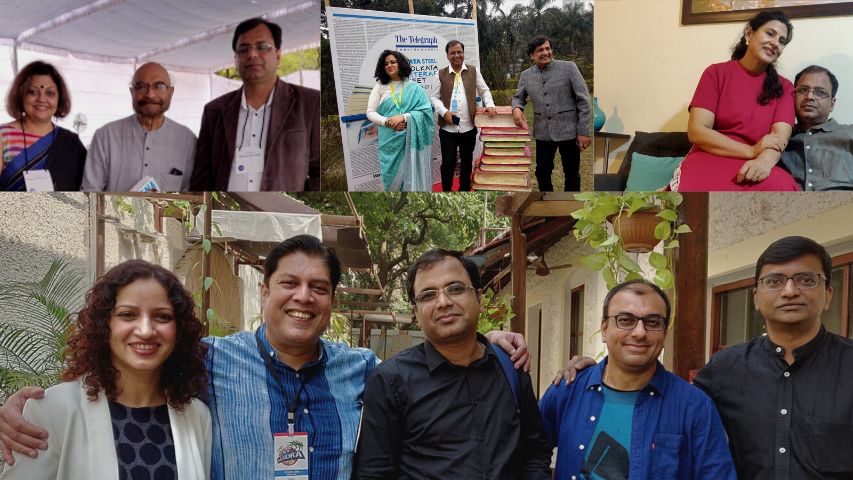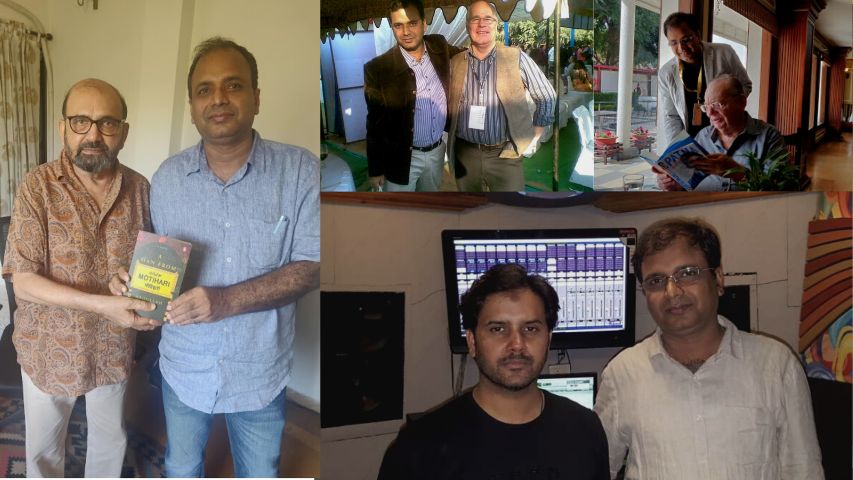-853X543.jpg)
A MAN FROM MOTIHARI: ABDULLAH KHAN
by Aparajita Krishna April 13 2023, 12:00 am Estimated Reading Time: 13 mins, 13 secs\Aparajita Krishna writes, “The Boy of ‘Patna Blues is now A Man From Motihari!”
Post the release of Abdullah Khan’s debut novel published in 2020 here comes his second book. It is published by Penguin Random House India. We get talking about the story, the backstory and emotions and feelings floating inside him at this point of time of the book release. He is already a known one-book-old author.
Abdullah Khan had kindly shared with me the manuscript of ‘A Man From Motihari’. This exchange follows my reading the book. The online sales booking of the book had already started, and the book had hit the book stores on 27th March 2023. A series of book-signing-events at bookstores and venues follow.
We get talking over the book.
As an author, tell us of your emotions around this second book release.
My first novel, Patna Blues, was published in 2018 and then I rewrote the same novel in Hindi. After its success, I was under pressure from my readers to write a sequel to Patna Blues. I tried but the storyline was not working for me. So, I decided to write A Man From Motihari, which is about George Orwell’s connection with Motihari (in the state of Bihar in India). The story was with me for many years before I decided to turn it into a novel a few years ago.
For an author, the second book is the most challenging stage of his or her literary career. I was under tremendous pressure while writing this book as there were a lot many expectations from various quarters to make it as engrossing as my first novel. Now, after the book is out in the world, I feel relieved and satisfied.
Share with us how this book organically grew in you as a writer. The seeds and thereafter.
In 1992, while helping my younger brother with his English assignment, I stumbled upon a story by the English novelist Eric Arthur Blair, popularly known as George Orwell (1903 - 1950). After learning that the interesting fable was part of a larger piece of work, I read Animal Farm, and became a lifetime devotee of Orwell. I loved his allegorical depiction of Russia under Stalin, a perfect example of a great revolution going wrong. Surprisingly, he was born in Motihari, the town in my home district, approximately 170 Kms north of Patna.
Many years later, an assignment from a Bangladeshi newspaper brought me to the old bungalow in the Miscout area of Motihari where George Orwell was born. And, while I was standing in front of the house, I wondered what if a boy from this town was also born in this same house. How will it impact his life if he comes to know that Orwell and he were born in the same bungalow?
From these initial thoughts, I scribbled a brief synopsis in my notebook the same day. It has now become a novel. The blurb reads like this: On a rainy night of 25th June 1976, in a bizarre turn of events, Aslam Sher Khan was born in an abandoned bungalow at the outskirts of Motihari, India. Interestingly, George Orwell had also been born in the same house exactly 73 years earlier. Aslam’s birth was facilitated by a mysterious midwife who vanished into thin air just after Aslam’s birth. Later, Aslam begins to believe that he has some supernatural connection with George Orwell and tries to become a writer. His literary ambitions bring him to America where he meets Jessica, an ex-porn star, and now an actor and activist, and he falls hopelessly in love with her. This novel is about these two unlikely characters and their journeys. Their love story is heading towards a fairy tale ending, when Aslam gets tangled in a political event in India, and something happens that changes his life forever.

A Man From Motihari, though originally written in English, ought to be read in many Indian languages. Tell us about the ways you intend to reach out to a bigger readership.
You will be happy to know that A Man From Motihari is going to be translated into many languages. I already have confirmed offers from Marathi, Telugu and Punjabi Publishers. My publishers, Penguin, have a dedicated marketing and publicity team to take care of my book. There will be a few book signing events and literature festival appearances.
To me the book in many parts echoes the strands and nostalgia of Patna Blues. Quite obviously a memoir of sorts. Arif Khan is herein Aslam Sher Khan. I got some sense of the Deja vu of Patna Blues. Is that right?
Since, both my books are set in the Bihari hinterlands, there are some common themes and settings. But as far as the storylines are concerned, they are different. The moral values of Aslam are a bit different from Arif. Unlike Arif, Aslam is more practical. And unlike Arif, Aslam doesn’t sacrifice everything for his family, and goes against his family to marry Jessica.
I found your language and flow herein more assured than in Patna Blues. Would you agree?
Thank you very much for your kind words. I can’t comment on this matter and leave it to the readers and literary critics like you.
My partiality-curiosity has a lot to do with my own belonging to Bihar and in particular to this belt-region, Motihari. Muzaffarpur is my birthplace. You put the local places, localities, lanes, landmarks, ambience very intimately in your narrative. They become characters. Interior Bihar and its names will resonate in a literary-way with strangers too. Local is Global.
Every writer has his own unique style. Mine is that I love to give the readers a sense of time and place. Moreover, I believe that settings are also characters in a story. Change the setting, the same story will sound different.
Your writing has an innocence about it. You do not camouflage your excitement as a writer. One can read it in your prose. Your youthful fascination for the opposite sex and for books figures majorly. As also the protagonist herein desperately yearning for The Booker. To be fair to you, you write out the protagonist’s failures, both personal and professional. So, obviously it is majorly autobiographical?
I have set my stories in a milieu I am familiar with and in the places where I spent major part of my formative years, but they are not autobiographical. The main plots are figments of my imagination only.
The book has a very good start/beginning. ‘I was born in a haunted bungalow. And the midwife was a ghost. Or, so says my family.’ AMFM is an engrossing, enriching and interesting story about Aslam Khan, born in the same bungalow where George Orwell was born, and living his life as an Indian Muslim man from the late 1980s until recent years. A story set in the backdrop of some challenging socio-political and cultural times in India, the book combines fiction, surrealism and reality. It is about Aslam’s nostalgic journey into his childhood in Motihari in Bihar, across different places in Bihar, to his teenage years and adulthood in different parts of India, like Ahmedabad. The book informs of a Muslim cultural ambience. It weaves in strands of his relationships with family, friends, lovers. Am I right?
Yes
George Orwell keeps getting mentioned. His presence in Motihari’s present is not past. Aslam wants to be a writer inspired by George Orwell. It is you talking.
No, it is not me. Aslam is not like me. But it is also true that Orwell was one of my inspirations.
Tell us about the surrealism bit. Midwife was a ghost. Lady in white comes in Aslam’s dreams. Background of spirits, supernatural inhabit the talks. Why so?
When George Orwell was in Motihari, he had an Indian nanny who was a local woman from a poor family. Almost for a year she virtually raised Orwell. Many years ago, I got a chance to see her photo with one-year-old Orwell. But nothing much is known about her. The Blairs left for England when Orwell was just one. We don’t know after that where that lady went. So, I have tried to tell a fictional story of the Nanny.
The personal relationships in the book majorly feature Aslam-Arvind friendship, Jai-Veeru nomenclature. Arvind is a voracious reader.
I had a maths teacher during school time called Arvind Kumar Khan who was well read and very intelligent. So, I always wanted to have a character like him in my novel.

Aslam’s relationships with women get written candidly. There is yearning, sex, fantasies and rejections. There is complexity. As in Patna Blues herein too you delve into the adolescence fantasies about sex and attraction. There is Mahrukh, then the Aslam-Heba wedding and nuptial night description, Aslam worried about sex, Heba is the first woman in his life, sex is a struggle. There is also the father-daughter emotion when later in 2009, daughter Kainat is born at Darbhanga. Then Aslam’s problems at office and in sexuality with Heba in marriage. Heba leaves home with the daughter. After a fierce verbal fight over the phone with Heba, he says, ‘Talaq talaq talaq’. Aslam then meets Jessica in LA. She looks after him. Aslam tries to re-unite Jessica with her estranged family and also tries to check out his feelings for Jessica. Heba, his wife, is now an American citizen. Aslam’s family traces her out and gives him her cell number. He wants to file a child custody case for his daughter and goes to New York. Heba is married to Shoaib. Daughter Kainat is in India. Aslam flies to India. Kainat is in a boarding school in Dehradun. Back in Los Angeles Aslam pines for Jessica. Do give your writer input to my references.
I love thickly plotted stories. So, as a writer I do the same. To write about Jessica and the stories set in Los Angeles, I did a lot of research. Especially, to write about the Southern Baptists, I read many books, watched hundreds of videos, interviewed many men and women from similar backgrounds and even talked to a priest from a church. In the process, I learnt a lot of new things. I was surprised to know that for Southern Baptist Christians, drinking alcohol is a sin.
The political India and events get played out in parallel to Aslam’s story. Ayodhya, the Babri Masjid-Ram Temple heat, fermenting the air and the movement for the Ram Temple in Ayodhya become a part of a parallel narrative. The Ram Janam Bhoomi movement also accompanies the environs of the book’s flow. ‘The president of the Indian Nationalist Party, Lalwani, with his trademark toothbrush moustache and sinister smile, was on the cover.’ Reference is obvious. There are references to the train burning with karsevaks, anti-Musim riots in Ahmedabad, Bihar under CM Naresh Kumar (implying Nitish Kumar). Aslam confronts these situations. Obviously, the young Muslim writer in you is, as it ought to be, also a presence, a POV. Do you agree?
No story exists in a vacuum. So, it is obvious that the socio-political changes around Aslam will certainly impact him, directly or indirectly. Plus, Aslam must have views about those changes.
I liked the point of view of Aslam saying, “Wow! Good argument! As a Muslim, I can be held responsible for the wrong deeds done by Muslim kings, who aren’t even related to me, but you, as a high caste Brahmin, are not responsible for the awful things your grandfather or great-grandfather did to the low caste Hindus.” ‘What do you mean by that?’ Shambhu lost his temper.
It is Aslam’s point of view. He simply wants his friend to not put too much emphasis on the past.
There is in the book an interesting play of emotions via cricket. Then there is the subtext from an Indian Muslim POV and some accompanying suspicions. In the India v/s West Indies match Azhar, the Indian player, is a Muslim. In 2014 India had a BJP government at the centre. Then there is the fictitious name Hasmukh Shah. The Citizenship Amendment Act bill also comes up - 'As a Muslim, I might have to face the repercussions of the bill in the near future.’ Aslam attends the Shaheen Bagh Protest in Delhi. ‘In the evening, several news channels were carrying the story of Jessica participating in the anti-CAA protest…The famous director Manoj Kashyap, who was better known for his anti-establishment stand, would also be there.’ Do expand on a personal note the Muslim identity in India 2023.
I'd just like to say that it is not easy to be a minority.
Arundhati Roy and her book’s figure - ‘Charmed by the author’s inventive prose and unique character descriptions, I craved to write like her’. There is Aslam’s tryst as a journalist in Patna. On the wall of his lodge-room are photographs of Arundhati Roy, Vikram Seth, Salman Rushdie, J.M. Coetzee, Peter Carey, V.S. Naipaul, Awanish Kumar, Rohinton Mistry, Amit Chaudhuri and Romesh Gunesekera. There is a kind of an obsession with Arundhati Roy, Salman Rushdie, Booker Prize: ‘How foolish of me to think that I could be a successful writer like Arundhati Roy, Salman Rushdie or Vikram Seth because some mysterious village woman had told me that I was an incarnation of George Orwell.’ Is that your personal dilemma too? (My smiling emojis).
Not exactly, but I like all these writers and have learnt a lot from them.

The book ends with Aslam talking of his imagined death scenario. ‘As I entered, I saw that my body was lying on the bed…If my dead body is lying on the bed, then who am I? I didn’t have the answer. From the expressions on every face in the room, I knew they could not see me.’ I found the end interesting, but very abstract. The lady in white track continued. Do share your intention and how you see it.
As a writer, I never wanted to tell my readers that the lady in white really existed, but to allow them to draw their own conclusion. It is a possibility that she is a creation of Aslam’s over-creative mind or maybe he is hallucinating. But there is also a possibility that she really exists.
Do you see this book as a film or web-series? If so, who are the actors you would want to feature in it and who should ideally direct it?
A Man From Motihari has a lot of cinematic potential and it will appeal to a global audience. I hope some production house decides to option it. I’d have loved to see a younger version of Hrithik Roshan as Aslam Sher Khan and Sidharth Malhotra as Arvind Kumar Khan. Shahid Kapoor can also be a good choice for Aslam’s character. Jennifer Shrader Lawrence would be my choice for Jessica’s role.
Let me revert back to Patna Blues. Is Patna Blues being made into a film or web-series? If so, by whom and by when?
The cinematic rights have already been sold to a well-known production house and they are trying to find a suitable director for it. I can't reveal further details because of contractual obligations.
What next is lined-up in writing?
I am working on my third novel, The Serene Sadness of Saleem Siddiqui, in addition to a web-series for a reputed production company.





-173X130.jpg)

-173X130.jpg)
-173X130.jpg)
-173X130.jpg)
-173X130.jpg)
-173X130.jpg)